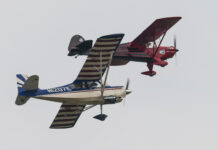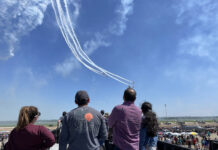Call it an occupational hazard, or — for some — a vocational hazard. Full-time event organizers are in a distinct minority in the air show business. Some handle their air show responsibilities as one part of a larger job with other demands. Others work a “day job” and then attend to air show business on the nights or weekends. On the military side, air show managers are often pulled from staff officers who rotate through on time-limited duty cycles, so they have little chance to learn from year to year. It would be nice if there were more full-time professionalism associated with organizing air shows, but even that isn’t a panacea.
ICAS President John Cudahy observes, “There are good shows that don’t have full-time event organizers. There are less successful shows that do have full-time event organizers. Like our pilots, we have a widely varying group of organizers. A minority of them are full-time, very good, and completely focused on the challenges and opportunities of organizing and conducting world-class air shows. But more typically, the person in charge is part-time with another job and/or they’re underfunded and/or they don’t have the skill set required to put on a great show.”
How can this situation be corrected? What are the challenges that face even the best show organizers? And what can the industry do to make the most of the situation?
Air show organizers need a broad range of skills. They have to be top flight marketers, experts on sponsorship issues, logistics wizards, air/ground operations specialists, parking magicians, ace traffic cops, hospitality bon vivants, and sharp-penciled budget-and-finance bean counters. It also helps to be savvy and well connected politically. As you can see, these skills are not only numerous, but widely diverse. You usually don’t think of traffic cops or number crunchers in the same mindset with the politically adept.
Cudahy added, “They need to be able to talk with the press, schmooze with the sponsors, and — generally — represent the air show in a myriad of different situations and widely varying types of people. As daunting as all that may seem, there are some who do all of these things well.”
A few of these organizers widely regarded as doing a strong, all-around job include:
Ed Downum runs the Marine Corps Air Station Miramar Air Show in San Diego. He is retired military and also ran the MCAS El Toro air show before that base was closed. Miramar is the one military show that is run most like a civilian show.
Brenda Kerfoot runs the Vectren Dayton Air Show. Before that, she ran the Muskegon Air Fair in Michigan.
Byron Newell is a Lieutenant Colonel with the Missouri Air National Guard. Impressively, his organization was named recipient of the Dick Schram Memorial Community Relations Award after its first show.
Kevin Walsh runs the Thunder Over Michigan air show. His dad founded the London International Air Show in London, Ontario, Canada, so Kevin grew up in the business.
Harry Wardwell, now retired, ran the California International Airshow in Salinas for many years.
We asked these proven show organizers a few questions about their craft, and their responses were illuminating. Perhaps their experience can guide the way for less experienced show organizers…or those who might feel overwhelmed by their accidental once-a-year exposure to the industry. So here are the questions, and the responses (edited for space), from some of the tops in the field.
What skill sets are most important for an effective air show organizer?
Downum: The key skill sets that I would identify are: project management, leadership, financial tracking, public relations, marketing, inventory control, trouble shooting and problem solving — both long term and short term — and on-the-spot issues.
Kerfoot: It is essential to be detail-oriented, which sounds cliché until you are the sponsor or customer whose important detail was forgotten. This encompasses all areas of air show management, including the obvious: financial oversight.
Newell: I would say flexibility and a good sense of humor; but what it boils down to is passion for air shows and aviation in general. If you’re passionate about air shows, you want the experience to be great for everyone: the crowd, your volunteers, sponsors, staff, performers, first responders…everyone. If you’re doing the job because you love it, and not just as a required collateral duty, then everything else will flow from that.
Walsh: Coordination and organizational skills are at the forefront. And the vision to see forward; to anticipate all the variables in both planning and execution. You have to avoid the “it’s covered” complacency. For example, you may have had no issues with parking for years, but what if a nearby water main breaks?
Wardwell: Running a civilian community-based show, I would say business, marketing and sponsorship development skills are the most important. As the organizer, you have overall responsibility for the sustainability of the organization to make sure it is financially viable. Also, you have to have relationships in the community to help coordinate potential sponsors, identify good candidates for board members, committee members, and volunteers. Someone who is well connected in the community can identify key individuals with talents for air operations, security, hospitality, marketing, etc.
What would make you better at what you do?
Downum: I could use a few full-time employees on my staff. I could definitely use more administrative support personnel to help keep track of the hundreds of milestones and checklist items during the planning and execution phases. My working budget is adequate, but limited and getting smaller, especially with the upcoming budget cuts of sequestration upon us.
Newell: A. More time to do it; it’s not my only job, so between air shows my focus must shift to other priorities. B. Because I have other responsibilities between air shows, I tend not to give enough attention to after-action reports, gathering of statistics, analysis, and data capture. I’m always on the lookout for one person good enough at those tasks to make it their primary responsibility.
Walsh: Having “the time and the team” to think out the maximum number of variables. When faced with a situation, it’s great to be able to say, “Stay calm, we have a Plan B.”
Wardwell: I am now retired from the show, but what made me better was certainly the experience of running the show over a long number of years. I think it is important to have relationships with other air show organizers, so you have sounding boards to discuss challenges and opportunities in the business.
What could performers do to make your job of organizing air shows more effective?
Downum: I select performers based on the variety of their performances for entertainment, and based on their support requirements and their flexibility to work with my air show schedule. I also choose performers based on their reputations and references from other performers or other event organizers I know, or from observing and meeting the new performers personally. In general, I select from the ICAS members primarily because I know they are reputable and operate in a well managed system.
Kerfoot: The basics: timely response to communication, a clear contract with all specific expectations/demands outlined (fees, fuel/oil amounts, hotel rooms/days, rental vehicles/days, performance time, media ride capabilities, etc.), a professional media kit immediately available upon hire, willingness to do sponsor meet/greets on the show site, showing up on time to any pre-scheduled media interview or ride.
Newell: Overall, our performers have been outstanding, and I have no complaints. The best to work with are those who go above and beyond to interact with your crowd, staff, and sponsors not just at the air show, but also at related community events. Those who help promote the show and enhance the overall experience for those involved, and appear to be having a good time doing it.
Walsh: Bring a professional attitude to the show. “Low maintenance” performers are the best; not that it’s not okay to be high maintenance when needed. But don’t call the Wednesday before a show weekend with a question – asking for an extra hotel room, for example – when you could have asked five months ago. I make the analogy of asking a pilot for a special request just before he or she is about to go fly.
Wardwell: Over the years, I saw a huge improvement in the professionalism of our civilian performers. Most of them today “get it” and understand how difficult it is to put on an air show. I had great pleasure working with dozens of performers who had good press packages, understood the importance of schmoozing with a local sponsor or the media, and most importantly flew a safe air show.
If you could have three wishes, what would you change that would make the biggest difference in improving your show?
Downum: 1) I could use a few more days on the front and back of my air show weekend for set up and tear down. 2) Expand the scope of the event to include other events like a concert, or guest speaker dinner, or aviation symposium gathering. 3) More manpower and volunteers!
Kerfoot: 1) Guaranteed military jet team participation every year. 2) Guaranteed military single-ship demos every year. 3) Perfect weather the week leading up to the show and through the show weekend.
Newell: 1) Easing of restrictions to military participation in air shows. Tough times call for tough measures, but we all want to see the military return to air shows in strength as time goes on. 2) Separate four-lane ingress and egress routes and a huge, paved parking lot. 3) I’m a military air show organizer, but we partner with the local Chamber of Commerce for the private portion, and I would say overall more money in the reserve fund. In the end, every air show organizer would wish for more money.
Walsh: 1) An unlimited marketing and advertising budget. We put on a great show here, and I’d love to get a quarter million people out to see it. 2) End sequestration, the biggest challenge of 2013. It’s ripped away the best opportunity for honest contact between the public and our soldiers, and that’s a tragedy. There is also $1.3 billion in economic impact. 3) There is no third wish. We’ve got it pretty good.
Wardwell: Today the biggest challenge is the military budget constraints and the potential impact that it could have on attendance at air shows. If we could broaden our base of entertainment to make up for the lack of military participation, that would be great. We need to excite children and families to want to come out and enjoy the day of education and entertainment, and family fun.
What is the least understood aspect of organizing an air show?
Downum: From my perspective, it’s the domino effect [that occurs] when someone wants to make “just one small change” to something in the plan. They just don’t understand how much that usually will affect so many other aspects of the show that now have to be changed, and on and on.
Kerfoot: That we are a business. We are a non-profit. But when I tell people we have a $1.5 million budget, but we’re only open 18 hours a year, and are subject to the weather (and now the government), they quickly realize this is a tough business.
Newell: The breadth of rules and regulations that govern the conduct of the show, from the FAA to the Air Force to local law enforcement. Most people not intimately involved with the planning don’t understand how every decision regarding execution and spending has to go through that wringer.
Walsh: People think we spend all our time booking pilots and acts. That’s just a small fraction of what we do. We cover all the responsibilities. An example: “There’s a strawberry festival nearby the same weekend, so will there be a problem getting Porta-Johns?” The responsibilities include rules and regulations, and the safety and comfort of spectators. We want them to come back. For me, the most rewarding experience is when my phone does not ring.
Wardwell: How much work it is. It takes 12 months to put on a successful air show.
Do you feel you have the support you need from the sponsors of the show, and if not, what could they do to make the biggest difference?
Downum: Yes. We are very selective with our sponsors for the show, about 25 of them each year. We have sponsors that provide cash, and those that provide in-kind services, i.e. radio, TV, print advertisements that are worth a lot more to us than we can afford to pay in cash.
Kerfoot: We are fortunate to have terrific sponsor support, and — generally — we are very satisfied and grateful for all that they do to support our show. A tricky area for some sponsors who are retail-oriented is getting them to use their contact databases to promote the show. For obvious reasons, many have rigid rules which do not permit that type of use.
Newell: Absolutely. Sound of Speed sponsors are as good as they come.
Walsh: Lack of sponsorship is an Achilles heel for us in the Detroit area, even though an air show is a great opportunity for a direct sponsor. We’ve made up for the lack of funding by implementing premium seating, with three tiers of seating options that helps make up for the shortfall in sponsor funds.
Wardwell: The California International Airshow at Salinas has had a very successful sponsorship program for many years. Our sponsors are all involved and support our efforts. Yes, they want a return on their investment, but they also see our event as a major community event that raises thousands of dollars for charity. They want to be involved and supportive. In September 2001, our show was 9/11 weekend. Our sponsors continued to support our event with their sponsorship, even though we weren’t able to fly one airplane during the show.
Professionalism among show organizers is just as important as it is among performers – even more so in many ways. Without effective show organizers, the potential for long-term success for any show could be severely compromised. And in the final analysis, putting on the best show possible, every time, is best for everyone in the industry.








